北外历年英汉同声传译专业考研试题2001--2009
- 格式:doc
- 大小:141.00 KB
- 文档页数:49
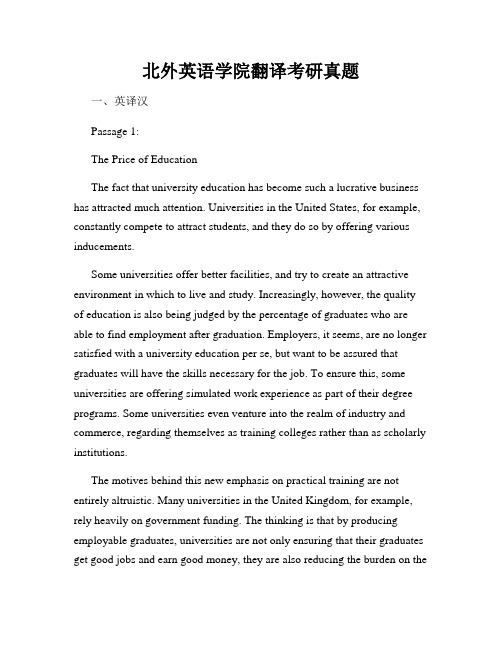
北外英语学院翻译考研真题一、英译汉Passage 1:The Price of EducationThe fact that university education has become such a lucrative business has attracted much attention. Universities in the United States, for example, constantly compete to attract students, and they do so by offering various inducements.Some universities offer better facilities, and try to create an attractive environment in which to live and study. Increasingly, however, the quality of education is also being judged by the percentage of graduates who are able to find employment after graduation. Employers, it seems, are no longer satisfied with a university education per se, but want to be assured that graduates will have the skills necessary for the job. To ensure this, some universities are offering simulated work experience as part of their degree programs. Some universities even venture into the realm of industry and commerce, regarding themselves as training colleges rather than as scholarly institutions.The motives behind this new emphasis on practical training are not entirely altruistic. Many universities in the United Kingdom, for example, rely heavily on government funding. The thinking is that by producing employable graduates, universities are not only ensuring that their graduates get good jobs and earn good money, they are also reducing the burden on thestate. Indeed, in some countries, universities that fail to achieve high levels of graduate employment are actually penalized financially.But what is sacrificed in this obsession with practicality? The traditional concept of a university is based on the belief that knowledge is valuable in itself, and that the purpose of education is the pursuit of truth. To surrender this belief and degrade the university to the role of industry training center is to throw the baby out with the bathwater. Certainly, graduates must be able to find employment to support themselves, but a society that puts material gain above all else is a society that has lost its soul.Passage 2:Another Look at Cross-cultural CommunicationThe common expectation of much cross-cultural training is that it is designed to help business people improve their cross-cultural communication competence, thus increasing performance in a variety of multicultural or international contexts. Cross-cultural training often takes the form of brief seminars, sometimes with hands-on experiential exercises and is meant to be enjoyable, eye-opening and informative. Many authors believe that by offering such training, organizations are doing the right thing for their employees because effective cross-cultural communication skills can be a competitive advantage in business.However, less attention has been given to understanding the linkage between the skills and competencies that have been delineated and measured and the ability of learners to effectively apply such knowledge and abilities in specific situations they are likely to encounter at work. Despite the proliferation of studies advocating the use of cross-cultural training toenhance global management effectiveness, very little is known about how training may affect the actual performance of individuals or groups that are experiencing business or mission/aid-related challenges outside of their native cultural contexts.In today’s globalized and technological world, businesses and individuals are more connected across cultural boundaries than ever. In fact, almost all businesses from small to multinational employ individuals who have some form of cross-cultural interactions on a daily basis. By increasing our understanding of the linkages between knowledge, skills and abilitiesand desired training outcomes, we may be able to help individuals and organizations more effectively navigate the challenges associated with increasingly dynamic and complex cross-cultural task environment in which they operate.二、汉译英翻译 Passage 1:教育的代价大学教育已成为一个利润丰厚的生意,这一事实引起了广泛关注。
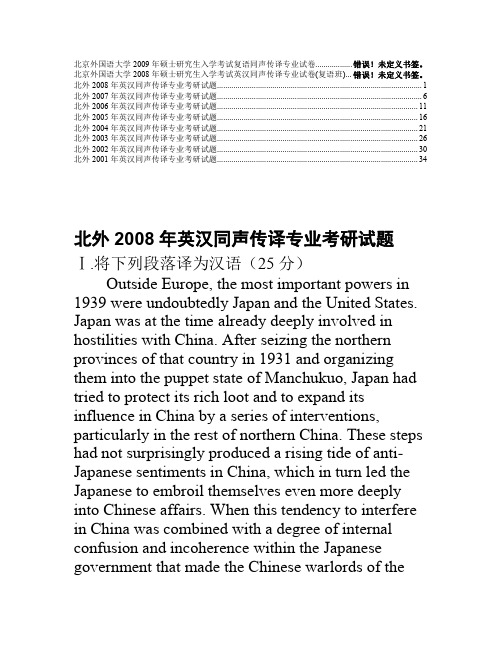
北京外国语大学2009年硕士研究生入学考试复语同声传译专业试卷..................错误!未定义书签。
北京外国语大学2008年硕士研究生入学考试英汉同声传译专业试卷(复语班)...错误!未定义书签。
北外2008年英汉同声传译专业考研试题. (1)北外2007年英汉同声传译专业考研试题 (6)北外2006年英汉同声传译专业考研试题 (11)北外2005年英汉同声传译专业考研试题 (16)北外2004年英汉同声传译专业考研试题 (21)北外2003年英汉同声传译专业考研试题 (26)北外2002年英汉同声传译专业考研试题 (30)北外2001年英汉同声传译专业考研试题 (34)北外2008年英汉同声传译专业考研试题Ⅰ.将下列段落译为汉语(25分)Outside Europe,the most important powers in 1939were undoubtedly Japan and the United States. Japan was at the time already deeply involved in hostilities with China.After seizing the northern provinces of that country in1931and organizing them into the puppet state of Manchukuo,Japan had tried to protect its rich loot and to expand its influence in China by a series of interventions, particularly in the rest of northern China.These steps had not surprisingly produced a rising tide of anti-Japanese sentiments in China,which in turn led the Japanese to embroil themselves even more deeply into Chinese affairs.When this tendency to interfere in China was combined with a degree of internal confusion and incoherence within the Japanese government that made the Chinese warlords of thetime look well organized,new trouble was almost certain to follow.(141words)Ⅱ.将下列短文译为汉语(50分)Inflation:China’s least wanted exportWhen inflation starts to kill people then it is a serious problem.Three people died and31were injured on Saturday in a stampede to buy cut-price cooking oil in the western Chinese city of Chongqing. China can no longer explain away inflation as a short-term result of floods and epidemics of animal disease?nor can it ignore the strains its macroeconomic policies are producing.Cooking oil is a special case?its price influenced by demand from China’s glut of new biofuel refineries?but the broader price of food has risen in recent months by more than15per cent compared with a year earlier.Floods and other acts of God have had their effect,as has the global rise in wheat prices,but there are structural forces at work as well.Nor is inflation confined to food any longer: producer prices are creeping up.The PPI for manufactured goods was up3.2per cent in October? many steel products rose by more than10per cent? and the PPI is likely to go even higher when the recent10per cent hike in the controlled pump price of diesel feeds through.Given the likelihood thatmore state-controlled prices will have to rise,and given that the official inflation data do not properly capture important prices,such as the cost of education,the real situation may be even worse.That is a worry for the rest of the world,used to enjoying the“China price”,a seemingly open-ended deflationary pressure on the world economy.The surge in Chinese inflation since June has barely fed through into export prices yet?but it will.China’s currency has also been gently appreciating,but so far improvements in productivity have meant that Chinese manufacturers have not needed to raise export prices.If currency appreciation speeds up,that will change.The renminbi may have to rise faster because the tools that China is using to tackle inflation have not worked.Bank reserve requirements were hiked again over the weekend,to13.5per cent,but the strain on the banking sector’s profitability will start to tell.Interest rates have risen repeatedly,but with CPI inflation above6per cent,and benchmark lending rates only slightly higher,real interest rates are low.There must now be a low,but non-zero, probability that China opts for a one-off revaluation of the renminbi in order to ease its domestic monetary problems.That would be the right move. The adjustment would be easier both for China andfor the rest of the world if the renminbi had not been kept so low for so long.But the pain of unwinding global imbalances will only get worse the longer they are left.(451words)Ⅲ.将下列段落译为英语(25分)科学发展观是协调的发展观。
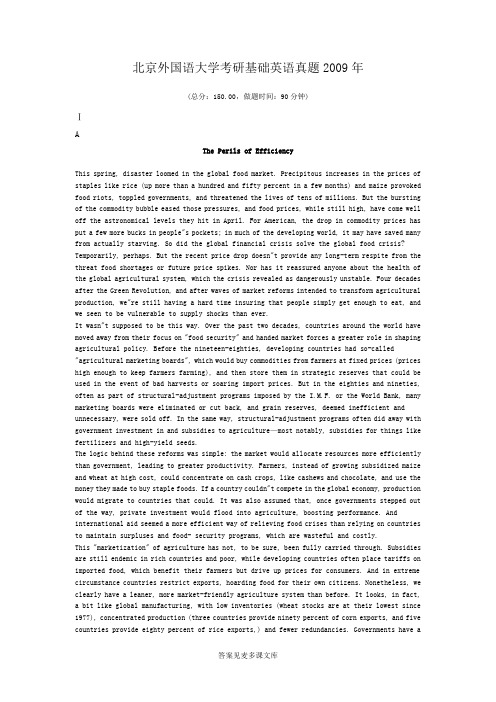
北京外国语大学考研基础英语真题2009年(总分:150.00,做题时间:90分钟)ⅠAThe Perils of EfficiencyThis spring, disaster loomed in the global food market. Precipitous increases in the prices of staples like rice (up more than a hundred and fifty percent in a few months) and maize provoked food riots, toppled governments, and threatened the lives of tens of millions. But the bursting of the commodity bubble eased those pressures, and food prices, while still high, have come well off the astronomical levels they hit in April. For American, the drop in commodity prices has put a few more bucks in people"s pockets; in much of the developing world, it may have saved many from actually starving. So did the global financial crisis solve the global food crisis? Temporarily, perhaps. But the recent price drop doesn"t provide any long-term respite from the threat food shortages or future price spikes. Nor has it reassured anyone about the health of the global agricultural system, which the crisis revealed as dangerously unstable. Four decades after the Green Revolution, and after waves of market reforms intended to transform agricultural production, we"re still having a hard time insuring that people simply get enough to eat, and we seen to be vulnerable to supply shocks than ever.It wasn"t supposed to be this way. Over the past two decades, countries around the world have moved away from their focus on "food security" and handed market forces a greater role in shaping agricultural policy. Before the nineteen-eighties, developing countries had so-called "agricultural marketing boards", which would buy commodities from farmers at fixed prices (prices high enough to keep farmers farming), and then store them in strategic reserves that could be used in the event of bad harvests or soaring import prices. But in the eighties and nineties, often as part of structural-adjustment programs imposed by the I.M.F. or the World Bank, many marketing boards were eliminated or cut back, and grain reserves, deemed inefficient and unnecessary, were sold off. In the same way, structural-adjustment programs often did away with government investment in and subsidies to agriculture—most notably, subsidies for things like fertilizers and high-yield seeds.The logic behind these reforms was simple: the market would allocate resources more efficiently than government, leading to greater productivity. Farmers, instead of growing subsidized maize and wheat at high cost, could concentrate on cash crops, like cashews and chocolate, and use the money they made to buy staple foods. If a country couldn"t compete in the global economy, production would migrate to countries that could. It was also assumed that, once governments stepped out of the way, private investment would flood into agriculture, boosting performance. And international aid seemed a more efficient way of relieving food crises than relying on countries to maintain surpluses and food- security programs, which are wasteful and costly.This "marketization" of agriculture has not, to be sure, been fully carried through. Subsidies are still endemic in rich countries and poor, while developing countries often place tariffs on imported food, which benefit their farmers but drive up prices for consumers. And in extreme circumstance countries restrict exports, hoarding food for their own citizens. Nonetheless, we clearly have a leaner, more market-friendly agriculture system than before. It looks, in fact, a bit like global manufacturing, with low inventories (wheat stocks are at their lowest since 1977), concentrated production (three countries provide ninety percent of corn exports, and five countries provide eighty percent of rice exports,) and fewer redundancies. Governments have amuch smaller role, and public spending on agriculture has been cut sharply.The problem is that, while this system is undeniably more efficient, it"s also much more fragile. Bad weather in just a few countries can wreak havoc across the entire system. When prices spike as they did this spring, the result is food shortages and malnutrition in poorer countries, since they are far more dependent on imports and have few food reserves to draw on. And, while higher prices and market reforms were supposed to bring a boom in agricultural productivity, global crop yields actually rose less between 1990 and 2007 than they did in the previous twenty years, in part because in many developing countries private-sector agricultural investment never materialized, while the cutbacks in government spending left them with feeble infrastructures. These changes did not cause the rising prices of the past couple of years, but they have made them more damaging. The old emphasis on food security was undoubtedly costly, and often wasteful. But the redundancies it created also had tremendous value when things went wrong. And one sure thing about a system as complex as agriculture is that things will go wrong, often with devastating consequences. If the just-in-time system for producing cars runs into a hitch and the supply of cars shrinks for a while, people can easily adapt. When the same happens with food, people go hungry or even starve. That doesn"t mean that we need to embrace price controls or collective farms, and there are sensible market reforms, like doing away with import tariffs, that would make developing-country consumers better off. But a few weeks ago Bill Clinton, no enemy of market reform, got it right when he said that we should help countries achieve "maximum agricultural self-sufficiency". Instead of a more efficient system. We should be trying to build a more reliable one.(分数:18.00)(1).What can be learned from the first paragraph?(分数:3.00)A.Global financial crisis destabilized governments.B.Food riots resulted from skyrocketing food bills.C.Financial crisis worsened food crisis.D.Food prices surged by 150% in April.(2).The food crisis revealed the global agricultural system as ______.(分数:3.00)A.fragileB.unresponsiveC.costlyD.unbearable(3).According to the third paragraph, structural-adjustment programs ______.(分数:3.00)A.were designed to cope with poor harvestsB.were introduced as part of "market forces" policiesC.removed price controls and state subsidiesD.encouraged countries to focus on food security(4).The marketization of agriculture probably means ______.(分数:3.00)A.private investment floods into agricultureB.market forces provide efficiency to agricultureC.agricultural policy works with the free market systemD.agricultural production is free from government intervention(5).Which of the following is NOT a feature of the existing agricultural system?(分数:3.00)A.Reduced government spending.B.Concentrated production.C.Self-sufficiency.D.Low wheat stocks.(6).In the last paragraph, the underlined words "the redundancies" probably refer to ______.(分数:3.00)A.high-yield seedsB.grain reservesC.cash cropsD.corn importsMinding the Inequality GapDuring the first 70 years of the 20th century, inequality declined and Americans prospered together. Over the last 30 years, by contrast, the United States developed the most unequal distribution of income and wages of any high-income country.Some analysts see the gulf between the rich and the rest as an incentive for strivers, or as just the way things are. Others see it as having a corrosive effect on people"s faith in the markets and democracy. Still others contend that economic polarization is a root cause of America"s political polarization. Could, and should, something be done?Claudia Goldin and Lawrence F. Katz, two Harvard economists, think yes. Their book, The Race Between Education and Technology (Harvard, $39.95), contain many tables, a few equations and a powerfully told story about how and why the United States became the world"s richest nation — namely, thanks to its schools.The authors skillfully demonstrate that for more than a century, and at a steady rate, technological breakthroughs—the mass production system, electricity, computers—have been increasing the demand for ever more educated workers. And, they show, America"s school system met this demand, not with a national policy, but in grassroots fashion, as communities taxed themselves and built schools and colleges.Beginning in the 1970s, however, the education system failed to keep pace, resulting, Ms. Goldin and Mr. Katz contend, in a sharply unequal nation.The authors allow that a decline in union membership and in the inflation-adjusted minimum wage also contributed to the shift in who partook of a growing pie. But they rule the usual suspects — globalization (trade) and high immigration—as significant causes of rising inequality. Amid the current calls to restrict executive compensation, their policy prescription is to have more Americans graduate from college.If only it were that easy.The authors" argument is really two books in one. One offers an incisive history of American education, especially the spread of the public high School and the state university system. It proves to be an uplifting tale of public commitment and open access. The authors remind us that the United States long remained "the best poor man"s country". A place where talent could rise. The other story rigorously measures the impact of education on income. The authors" compilation of hard data on educational attainment according to when people were born is an awesome achievement, though not always a gripping read.They show that by the 1850s, America"s school enrollment rate already "exceeded that of any other nation". And this lead held for a long time. By 1960, some 70 percent of Americans graduated from high school—far above the rate in any other country. College graduation rates also rose appreciably.In the marketplace, such educational attainment was extremely valuable, but it didn"t produce wide economic disparity so long as more people were coming to the job market with education. The wage premium—or differential paid to people with a high school or a college education—fell between 1915 and 1950.But more recently, high school graduation rates flatlined at around 70 percent. American college attendance roses, though college graduation rates languished. The upshot is that while the average college graduates in 1970 earned 45 percent more than high school graduates, the differential three decades later exceeds 80 percent."In the first half of the century," the authors summarize, "education raced ahead of technology,but later in the century technology raced ahead of educational gains."Proving that the demand for and supply of educated workers began not in the time of Bill Gates but in the era of Thomas Edison is virtuoso social science. But wasn"t a slowdown in rising educational attainment unavoidable? After all, it"s one thing to increase the average years of schooling by leaps and bounds when most people start near zero, but quite another when national average is already high.The authors reject the idea that the United States has reached some natural limit in educational advances. Other countries are now at higher levels.What, then, is holding American youth back?The authors give a two-part answer. For one thing, the financial aid system is a maze. More important, many people with high school diplomas are not ready for college.The second problem, the authors write, is concentrated mostly in inner-city schools. Because the poor cannot easily move to better school districts, the authors allow that charter schools as well as vouchers, including those for private school, could be helpful, but more evaluation is necessary.Data on the effects of preschool are plentiful, and point to large returns on investment, so the authors join the chorus in extolling Head Start, the federal government"s largest preschool program.Providing more children with a crucial start, along with easier ways to find financial aid, are laudable national objectives. One suspects, though, that the obstacles to getting more young people into and through college have to do with knotty social and cultural issues.But assume that the author"s policies would raise the national college graduation rate. Would that deeply reduce inequality?Averages can be deceptive. Most of the gains of the recent flush decades have not gone to the college-educated as a whole. The top 10 or 20 percent by income have education levels roughly equivalent to those in the top 1 percent, but the latter account for much of the boom in inequality. This appears to be related to the way taxed have been cut, and to the ballooning of the financial industry"s share of corporate profits.It remains to be seen how a reconfigured financial industry and possible new tax policies might affect the 30-year trend toward greater inequality.In the meantime, it is nice to be reminded, in a data-rich book, that greater investments in human capital once put Americans collectively on top of the world.(分数:18.00)(1).when can be learned from the book entitled The Race Between Education and Technology ?(分数:3.00)A.The wage movements in the U.S. are dominated by swings in the demand for education-related skills.B.The American educational system is what made American the richest nation in the world.C.Technology raced ahead of education in the first half of the 20th century.D.American high school graduation rates leveled off at 80 percent in 1970.(2).Which of the following is considered a significant cause of rising inequality according to Claudia Goldin and Lawrence F. Katz?(分数:3.00)A.High immigration rates.B.Increased executive compensation.C.Reduced union rates.D.Stagnate college graduation rates.(3).What does the underlined word " laudable " mean?(分数:3.00)A.Reasonable.B.Achievable.C.Deserving praise.D.Worth trying.(4).Which of the following led to the slowdown in American educational advances in the last three decades of the 20th century?(分数:3.00)A.No easy access to financial aid.B.Overemphasis on preschool programs.C.A dramatic fall college enrollment rates.D.A rise in the number of poor school districts.(5).What does the author think of the book entitled The Race Between Education and Technology ?(分数:3.00)A.It is a research on human capital.B.It is intended for economists.C.It is a happy fireside read.D.It is rich in data.(6).Which of the following is true according to the passage?(分数:3.00)A.The demand for educated workers began in the era of IT.B.The pace of technological change has not been steady.C.America is not educating its citizens the way it used to.D.High school graduation rates peaked in the U.S. in 1950.BGeneration What?Welcome to the socio-literary parlor game of "Name That Generation."It all began in a quotation Ernest Hemingway attributed to his Paris patron, the poet and saloonkeeper Gertrude Stein. On the title page of his novel The Sun Also Rises, published in 1926, he quoted her saying to her circle of creatively disaffected writers, artists and intellectuals in the aftermath of World War I, "You are all a lost generation."In the cultural nomenclature after that, the noun generation was applied to those "coming of age" in an era. Anne Soukhanov, U.S. editor of the excellent Encarta dictionary, observes, "Young people"s attitudes, behavior and contributions, while being shaped by the ethos of, and major events during, their time, came in turn to represent the tenor of the time."Taking that complex sense of generation as insightful, we can focus on its modifier as the decisive word in the phrases built upon it. The group after the lost generation did not find its adjective until long after its youthful members turned gray. Belatedly given a title in a 1998 book by Tom Brokaw, the Greatest Generation (which had previously been called the G.I. Generation) defined "those American men and women who came of age in the Great Depression, served at home and abroad during World War Ⅱ and then built the nation we have today."That period, remembered as one characterized by gallantry and sacrifice, was followed by another time that was described in a sharply critical sobriquet: in 1951, people in their 20s were put down as the Silent Generation. That adjective was chosen, according to Neil Howe, author of the 1991 book Generations, because of "how quiescent they were during the McCarthy era.., they were famously risk-averse." The historian William Manchester castigated the tenor of youth in that era as "withdrawn, cautious, unimaginative, indifferent, unadventurous and silent." Overlapping that pejorative label time was the Beat Generation, so named by the writer Jack Kerouac in the "50s. Though the author later claimed his word was rooted in religious Beatitudes, it was described by a Times writer as "more than mere weariness, it implies the feeling of having been used, of being raw.., a sort of nakedness of mind."Now we"re up to the "70s, dubbed by Tom Wolfe in New York magazine in 1976 as the "me decade". That coinage led to the general castigation of young adults by their elders in that indulgent era as the Me Generation, preoccupied with material gain and "obsessed with self". It was notso silent, far from beat, but still, in its own grasping way, a generation lost.Then came the title denoting mystery of the demographically huge generation born from roughly 1946 to 1964—begun as the Baby-Boom Generation, but in its later years its younger members took on a separate identity: Generation X. That is the title of a 1991 book by Douglas Coupland; "It is an identity-hiding label," the generationist Howe tells my researcher Caitlin Wall, "of what is the generation with probably the weakest middle class of any of the other generation born in the 20th century." While most boomers proudly asserted their generational identity, "Xers" at first did not; now, however, most feel more comfortable with the label. It has been followed by Y and Z, but those are too obviously derivative, and the Millennial Generation—if narrowly defined as those beginning to come of age since 2000—has members still knee pants.THE JOSHUA GENERATIONU.S. presidents like to identify themselves with the zeitgeist inspiriting their electorate. "This generation of Americans." F.D.R. told the 1936 Democratic convention, "has a rendezvous with destiny," the final three words later evoked by both Lyndon Johnson and Ronald Reagan. John F. Kennedy, in his 1961 inaugural address, said, "The torch has been passed to a new generation of Americans—tempered by war, disciplined by a hard and bitter peace, proud of our ancient heritage." Speaking in March 2007 mat a chapel in Selma, Ala., in commemoration of a bloody march for voting rights, Senator Barack Obama put forward a name for a new generation of African-Americans. After acknowledging "a certain presumptuousness" in running for president after such a short time in Washington, Obama credited the Rev. Otis Moss Jr. for writing him "to look at the Story of Joshua because you"re part of the Joshua generation".He noted that the "Moses generation" had led his people out of bondage but was not permitted by God to cross the river from the wilderness to the Promised Land. In the Hebrew Bible, it was Joshua, chosen by Moses to be his successor, who led the people across, won the battle of Jericho and established the nation. "It was left to the Joshuas to finish the journey Moses had begun," Obama said to the youthful successors to the aging leaders of the civil rights movements, "and today we"re called to be the Joshua of our time, to be the generation that finds our way across the river."Though the spirit of an age is best defined in retrospect, and religious allusion is not currently considered cool, the Joshua Generation—unlike all its era-naming predecessors—does have alliteration going for it.(分数:10.00)(1).The Greatest Generation is also referred to as "The Veterans".(分数:2.00)A.正确B.错误(2).William Manchester didn"t think highly of the Silent Generation.(分数:2.00)A.正确B.错误(3).The Beat Generation is characterized as being obsessed with material gain.(分数:2.00)A.正确B.错误(4).The Generation X follows the Baby-Boom Generation while the Generation Y precedes the Millennial Generation.(分数:2.00)A.正确B.错误(5).The Moses Generation refers to American leaders who fought for never saw the "Promised land" of racial equality.(分数:2.00)A.正确B.错误CTV Can Be Good for YouTelevision wastes time, pollutes minds, destroys brain cells, and turns some viewers into murderers. 1 . But television has at least one strong virtue, too, which helps to explain its endurance as a cultural force. In an era when people often have little time to speak with one another, television provides replacement voices that ease loneliness, spark healthful laughter, and even educate young children.Most people who have lived alone understand the curse of silence, when the only sound is the buzzof unhappiness or anxiety inside one"s own head. Although people of all ages who live alone can experience intense loneliness, the elderly are especially vulnerable to solitude. For example, they may suffer increased confusion or depression when left alone for long periods but then rebound when they have steady companionship.A study of elderly men and women in New Zealand found that television can actually serve as a companion by assuming "the role of social contact with the wider world", reducing "feeling of isolation and loneliness because it directs viewers" attention away from themselves". 2 .The absence of real voices can be most damaging when it means a lack of laughter.3 . Laughter is one of the most powerful calming forces available to human beings, proven in many Studies to reduce heart rate, lower blood pressure, and ease other stress-related ailments. Television offers plenty of laughter for all kinds of viewers: the recent listing for a single Friday night included more than twenty comedy programs running on the networks and on basic cable between 6 pm and 9 pm.A study reported in a health magazine found that laughter inspired by television and video is as healthful as the laughter generated by live comedy. Volunteers laughing at a video comedy routine "showed significant improvements in several immune functions, such as natural killer-cell activity". 4 . Even for people with plenty of companionship, television"s replacement voices can have healthful effects by causing laughter.Television also provides information about the world. This service can be helpful to everyone but especially to children, whose natural curiosity can exhaust the knowledge and patience of their parents and caretakers. 5 . For example, educational programs such as those on the Discovery Channel, the Disney Channel, and PBS offer a steady stream of information at various cognitive levels. Even many cartoons, which are generally dismissed as mindless or worse, familiarize children with the material of literature, including strong characters enacting classic narratives. Two researchers studying children and television found that TV is a source of creative and psychological instruction, inspiring children "to play imaginatively and develop confidence and skills". Instead of passively watching, children "interact with the programs and videos" and "sometimes include the fictional characters they"ve met into reality"s play time". 6 .The value of these replacement voices should not be oversold. For one thing, almost everyone agrees that too much TV does no one any good and may cause much harm. Many studies show that excessive TV watching increases violent behavior, especially in children, and can cause, rather than ease, other antisocial behaviors and depression. 7 . Steven Pinker, an expert in children"s language acquisition, warns that children cannot develop language properly by watching television. They need to interact with actual speakers who respond directly to their specific needs. Replacement voices are not real voices and in the end do only limited good.But even limited good is something, especially for those who are lonely, angry, or neglected. Television is not an entirely positive force, but neither is it an entirely negative one. Its voices stand by to provide company, laughter, and information whenever they"re needed.A. In addition, human being require the give-and-take of actual interaction.B. While the TV may be baby-sitting children, it can also enrich them.C. Thus runs the prevailing talk about the medium, supported by serious research as well as simplebelief.D. Here, too, research shows that television can have a positive effect on health.E. Thus television"s replacement voices both inform young viewers and encourage exchange.F. Television can be a positive practical training ground for moral growth in a changing world.G. Thus television"s replacement voices can provide comfort because they distract from a focus on being alone.H. Further, the effects of the comedy were so profound that "merely anticipating watching a funny video improved mood, depression, and anger as much as two days beforehand."(分数:14.00)ⅡTechnology and Intellectual Property: Problems and SolutionsAccess to low-carbon technologies in the developing world does not mean doing away with Intellectual Property Rights (IPRs). This has been the most emotive and appears the thorniest of issues. It should not be. 1 . The concerns of the developing world are principally about whether they will have access to technologies at fair or affordable prices, which are being pressed on them by the developed countries. The perceived issue may be hypothetical in many situations. Having no IPRs, or compulsory licensing—with the consequent risk of free-riding—is not the solution.2 . For most technologies, patents are not filed in the Least Developed Countries (LDCs), because the small potential markets do not justify the cost of obtaining patents there . In such cases domestic companies are free to use the invention in that country, but not for expect to a country where there is patent protection. Therefore, LPRs are unlikely to be inhibiting within these LDCs. If LDC manufacturers are permitted—through compulsory licensing—to manufacture for sale in a country where there is patent protection (for commercial reasons), then it will damage the incentive structure that IPRs create and should not easily be permitted.3 . Companies generally sell at differentially low prices in the LDCs provided that there is no leakage of these products back into their main markets, where they will sell at higher prices . The World Trade Organisation"s 2001 Doha Declaration provided for this in the case of pharmaceuticals. Some countries, such as Japan, would need to change their laws and regulations to prevent such trade.If there are relevant IPRs which do inhibit otherwise legitimate take-up in the developing countries, there are several solutions:·If the IPRs are publicly held, local LDC companies could receive a geographically limited license, at preferential or zero cost. 4 . This would not significantly damage the broader objective of promoting investment by the private sector in low-carbon technologies and products for use in countries where they will have a bigger carbon-reduction impact on reducing global carbon emissions.·If the IPRs are privately held, there are several solutions: their use can be paid for or subsidised by governments; they can be paid for subsidised by charities.Compulsory licensing is also possible. Compulsory licensing is permitted in most countries (except the US) as an exceptional measure in cases of abuse of monopoly or a national emergency, to limit the ability of an IPR owner to stop others from using the IPRs. Its use is constrained by WTO agreement and is intended to be used as a policy of last resort. A reasonable royalty must be paid to the IPR owner. So compulsory licensing is not a low- or zero-cost option. Compulsory licensing is permitted in Europe but there are no recorded examples of its use. 5 . It is generally regarded as a "nuclear option" by both governments and business, which will come an agreement without its use being invoked.(分数:40.00)______________________________________________________________________________________________________________________________________________________________________________________________________________________________________________________________________________。
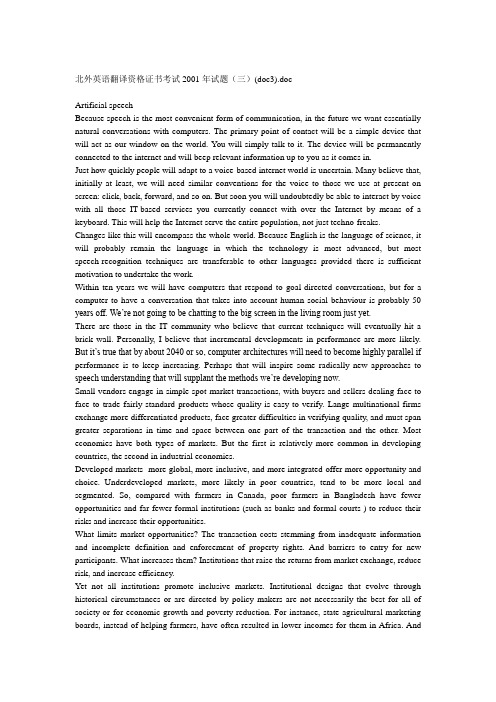
北外英语翻译资格证书考试2001年试题(三)(doc3).docArtificial speechBecause speech is the most convenient form of communication, in the future we want essentially natural conversations with computers. The primary point of contact will be a simple device that will act as our window on the world. You will simply talk to it. The device will be permanently connected to the internet and will beep relevant information up to you as it comes in.Just how quickly people will adapt to a voice-based internet world is uncertain. Many believe that, initially at least, we will need similar conventions for the voice to those we use at present on screen: click, back, forward, and so on. But soon you will undoubtedly be able to interact by voice with all those IT-based services you currently connect with over the Internet by means of a keyboard. This will help the Internet serve the entire population, not just techno-freaks. Changes like this will encompass the whole world. Because English is the language of science, it will probably remain the language in which the technology is most advanced, but most speech-recognition techniques are transferable to other languages provided there is sufficient motivation to undertake the work.Within ten years we will have computers that respond to goal-directed conversations, but for a computer to have a conversation that takes into account human social behaviour is probably 50 years off. We’re not going to be chatting to the big screen in the living room just yet.There are those in the IT community who believe that current techniques will eventually hit a brick wall. Personally, I believe that incremental developments in performance are more likely. But it’s true that by about 2040 or so, computer architectures will need to become highly parallel if performance is to keep increasing. Perhaps that will inspire some radically new approaches to speech understanding that will supplant the methods we’re developing now.Small vendors engage in simple spot-market transactions, with buyers and sellers dealing face to face to trade fairly standard products whose quality is easy to verify. Lange multinational firms exchange more differentiated products, face greater difficulties in verifying quality, and must span greater separations in time and space between one part of the transaction and the other. Most economies have both types of markets. But the first is relatively more common in developing countries, the second in industrial economies.Developed markets- more global, more inclusive, and more integrated-offer more opportunity and choice. Underdeveloped markets, more likely in poor countries, tend to be more local and segmented. So, compared with farmers in Canada, poor farmers in Bangladesh have fewer opportunities and far fewer formal institutions (such as banks and formal courts ) to reduce their risks and increase their opportunities.What limits market opportunities? The transaction costs stemming from inadequate information and incomplete definition and enforcement of property rights. And barriers to entry for new participants. What increases them? Institutions that raise the returns from market exchange, reduce risk, and increase efficiency.Yet not all institutions promote inclusive markets. Institutional designs that evolve through historical circumstances or are directed by policy makers are not necessarily the best for all of society or for economic growth and poverty reduction. For instance, state agricultural marketing boards, instead of helping farmers, have often resulted in lower incomes for them in Africa. Andinstitutions that once supported market transactions can outlive their usefulness, for example, privatization agencies and bank restructuring agencies. The challenge for policymakers is to shape institutional development in ways that enhance economic development.。
![北外基础英语2001[试卷及答案]](https://img.taocdn.com/s1/m/47ab0f094a7302768e993965.png)
北京外国语大学2001年研究生入学考试基础英语试卷ⅠA nation dividedWhat to do about the ever widening gulf between rich and poor?Mortimer B. Zuckerman We are becoming two nations. The prosperous are rapidly getting more prosperous and the poor are slowly getting poorer. George W. Bush did well to rebuke his party when House Republicans maneuvered to balance the budget by proposing to delay the earned income tax credit for the working poor—paying it in monthly installments rather than an annual lump sum. “I don’t think they ought to balance the budget on the backs of the poor,” Bush said. Instead, it is time for aspiring leaders to ponder how the two nations might more closely become one.The American economy is growing dramatically. But this prosperity is being distributed very unevenly. The America that is doing well is doing very well indeed. But most benefits have gone to those who work in industries where the main product is information. The losers have been the producers of tangible goods and personal services—even teachers and health care providers. The high-tech information economy has been growing at approximately 10 times the rate of the older industrial economy. It has enjoyed substantial job growth, the highest productivity gains(about 30 percent a year), and bigger profits. It can therefore afford bigger wage gains(about four times that of the older economy). And this wage gap is likely to widen for years to come.The rich get richer.The concentration of wealth is even more dramatic. New York University economist Edward Wolff points out that the top 20 percent of Americans account for more than 100 percent of the total growth in wealth from 1983 to 1997 while the bottom 80 percent lost 7 percent. Another study found that the top 1percent saw their after-tax income jump 115 percent in the past 22 years. The top fifth have seen an after-tax increase of 43 percent during the same period while the bottom fifth of all Americans—including many working mothers—have seen their after-tax incomes fall 9 percent. The result is that 4 out of 5 households—some 217 million people—will take home a thinner slice of the economic pie than they did 22 years ago.There are those who point out that these income figures do not fully reflect the improvement in the standard of living and say that attention should be paid to what Americans own, what they buy, and how they live, A fair point. Two economists, W. Michael Cox and Richard Alm, have revealed that each person in the average household today has 814 square feet of living space compared with 478 square feet in 1970;that 62 percent of all households own two or more vehicles compared with 29 percent back then; that the number of gas ranges has increased sixfold, air travel four times, and the median household wealth—i.e., the family right in the middle—has jumped dramatically. Even given such improvements in life quality, our public policy must not exacerbate the disproportionate concentrations of wealth.Fortunately, Americans are pragmatists. They know that what you earn depends on what you 大家论坛-英语专业考研版-真题+资料汇总/thread-2407892-1-1.htmllearn, especially in a digital economy; so 83 percent of our children now complete four years of high school, compared with 55 percent in 1970.This is good news. But vast numbers of people feel marginalized in an information-based economy. For too many, work no longer provides the kinds of wages and promotions that allow them to achieve economic success or security. Wage increases do not substantially increase their real income, so they have to work longer hours, get a higher-paying shift, or find another job. These are the people who are particularly concerned about the benefits they stand to gain from Medicare and Social Security. If they do manage to put together a successful strategy to survive, they should not be hit with sudden shocks—like the denial of the lump-sum tax credit.Bush may have discomfited his Republican colleagues, but his words served to remind that they are out of touch with the realities of life for so many Americans. He later softened his criticism, but it is time, nevertheless, for a more generous leadership from the House Republicans. They should not berate Bush. Indeed, they may well find themselves in his dept should his appeal to the center of American politics provide them the coattails they will need when voters head to the polls in just over a year.1. Explain the underlined part in English, bringing out the implied meaning, it there is any:(22%)(1)I don’t think…of the poor (3%)(2)The result is…22 years ago (3%)(3)A fair point. (2%)(4)our public policy…wealth (3%)(5)vast numbers…economy (3%)(6)These are…Social Security (3%)(7)they may well find…over a year. (3%)2. Answer he following questions briefly and to the point(13%)(1)What does it mean by the title “A Nation Divided ”? (3%)(2)What is the main reason for the widening gap of income, according to the writer?(5%)(3)How does the writer propose to solve the problem?(5%)Ⅱ. Translate the following into Chinese(25%)1. I can’t thank you enough.(2%)2. He suggested to me that more was to be gained than lost by full disclosure. I could not have agreed more.(2%)3. They could hardly have been more wrong. (2%)4. The conspirators had ganged together, their confidence growing with their number.(2%)5. Greed of money is not one of his faults.(2%)6. The convention bought time, it could not bring settlement.(2%)7. The reaty was approved by the Senate, with only one vote to spare.(2%)8. We agree to disagree without being disagreeable.(2%)9. His past is no more immune to scrutiny than anyone else’s.(2%)10. He knew that I knew that he guessed that I had guessed “Mister Williams”was Bill Stephenson. (2%)大家论坛-英语专业考研版-真题+资料汇总/thread-2407892-1-1.html11. The novels of Terror, set in some vague but picturesque foreign country and in some vague but picturesque historic period, told of haunted castles and sinister monks and mysterious crimes and high-born villains intent on the ruin of high-born beautiful maidens.(5%)Ⅲ. Translate the following passage into English(40%)秋风里的巴黎一下飞机,已经感觉到了巴黎的秋末了,刮起了略寒的风,空气中水分很足,润润的。
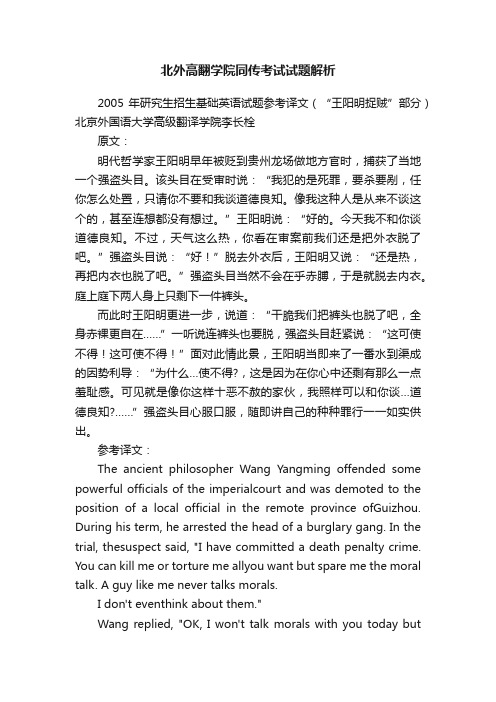
北外高翻学院同传考试试题解析2005年研究生招生基础英语试题参考译文(“王阳明捉贼”部分)北京外国语大学高级翻译学院李长栓原文:明代哲学家王阳明早年被贬到贵州龙场做地方官时,捕获了当地一个强盗头目。
该头目在受审时说:“我犯的是死罪,要杀要剐,任你怎么处置,只请你不要和我谈道德良知。
像我这种人是从来不谈这个的,甚至连想都没有想过。
”王阳明说:“好的。
今天我不和你谈道德良知。
不过,天气这么热,你看在审案前我们还是把外衣脱了吧。
”强盗头目说:“好!”脱去外衣后,王阳明又说:“还是热,再把内衣也脱了吧。
”强盗头目当然不会在乎赤膊,于是就脱去内衣。
庭上庭下两人身上只剩下一件裤头。
而此时王阳明更进一步,说道:“干脆我们把裤头也脱了吧,全身赤裸更自在……”一听说连裤头也要脱,强盗头目赶紧说:“这可使不得!这可使不得!”面对此情此景,王阳明当即来了一番水到渠成的因势利导:“为什么…使不得?,这是因为在你心中还剩有那么一点羞耻感。
可见就是像你这样十恶不赦的家伙,我照样可以和你谈…道德良知?……”强盗头目心服口服,随即讲自己的种种罪行一一如实供出。
参考译文:The ancient philosopher Wang Yangming offended some powerful officials of the imperialcourt and was demoted to the position of a local official in the remote province ofGuizhou. During his term, he arrested the head of a burglary gang. In the trial, thesuspect said, "I have committed a death penalty crime. You can kill me or torture me allyou want but spare me the moral talk. A guy like me never talks morals.I don't eventhink about them."Wang replied, "OK, I won't talk morals with you today butsince it's hot, I suggest wetake off our coats before the trial.""OK," said the suspect, and took his coat off."It's still too hot, perhaps we should take off our shirts too," said Wang.The gangster naturally didn?t mind being bare-chested, so he took off his shirt. Now bothof them had nothing leftbut their pants. Wang then said, "What about the pants? We?llbe more comfortable if we?re naked.""No way! No way!" protested the suspect.At this point, Wang cut to his point and said, "The reason why you wouldn't take off yourpants is that you still know shame. This proves that even a notorious and ruthless manlike yourself is concerned with morality. "The suspect was so impressed by Wang'sargument that he confessed all his crimes.2009年研究生入学试题参考译文和分析(“国庆节返乡”部分)/李长栓星期三, 05/06/2009 - 07:57—李长栓《国庆节回家》翻译中的主要问题北京外国语大学高级翻译学院李长栓理解问题汉语中充满了歧义。

北京外国语大学英语学院英语语言文学专业二外法语1995——2009二外德语1995——2009二外日语1995——2009二外俄语1995——2009二外西班牙语1998——2009二外法语(MTI)2010二外德语(MTI)2010二外日语(MTI)2010二外俄语(MTI)2010二外西班牙语(MTI)2010基础英语1995——2010(2000——2009有答案)基础英语(外研中心外语教育、外国语言专业)2007——2010英美文学1995——2010(2002——2008有答案)英美文学(外国文学所)2009英美文学文论与文化研究(外国文学所)2010英语语言学和应用语言学1995——2010(注:1995——1997年称“英语应用语言学”)(2002——2009有答案)美国社会文化研究1990,1995——2010(1990有答案)英国社会文化研究1995——2010澳大利亚研究1995——2010英、汉互译(笔译)(英语学院)2009英语翻译理论与实践(英语学院)1997——2008,2010(2000——2001,2003——2005有答案)英汉同声传译(高翻学院)1998——2008(2002——2005有答案)英汉互译(同声传译)(高翻学院)2009——2010复语同声传译专业试卷(高翻学院)2009——2010英语翻译基础(MTI笔译方向)2010汉语写作与百科知识(MTI笔译方向)2010翻译硕士专业学位(MTI)英汉互译(笔译)2009——2010翻译硕士专业学位(MTI)英汉互译(口译)2009——2010英汉对比与翻译2001高级翻译1995——1997外语教育2008——2009英语教育2002——2007外语语言研究方向专业试卷2008英语综合1985,1995——2002(1985有答案)语言测试2002——2007普通语言学2007普通语言学、外语教学2004——2006(2004——2005有答案)普通语言学及应用语言学(外研中心)2010句法、第二语言习得2003综合考试(含国际政治、汉语)2000——2002英语新闻业务与新闻学基础知识2006——2009国际新闻2010国际法学专业(无此试卷)外交学专业综合考试(含国际政治、汉语)2000——2002中国外语教育研究中心外国语语言学及应用语言学专业二外法语1995——2009二外德语1995——2009二外日语1995——2009二外俄语1995——2009二外西班牙语1998——2009二外法语(MTI)2010二外德语(MTI)2010二外日语(MTI)2010二外俄语(MTI)2010二外西班牙语(MTI)2010基础英语1995——2010(2000——2009有答案)基础英语(外研中心外语教育、外国语言专业)2007——2010英美文学1995——2010(2002——2008有答案)英美文学(外国文学所)2009英美文学文论与文化研究(外国文学所)2010英语语言学和应用语言学1995——2010(注:1995——1997年称“英语应用语言学”)(2002——2009有答案)美国社会文化研究1990,1995——2010(1990有答案)英国社会文化研究1995——2010澳大利亚研究1995——2010英、汉互译(笔译)(英语学院)2009英语翻译理论与实践(英语学院)1997——2008,2010(2000——2001,2003——2005有答案)英汉同声传译(高翻学院)1998——2008(2002——2005有答案)英汉互译(同声传译)(高翻学院)2009——2010复语同声传译专业试卷(高翻学院)2009——2010英语翻译基础(MTI笔译方向)2010汉语写作与百科知识(MTI笔译方向)2010翻译硕士专业学位(MTI)英汉互译(笔译)2009——2010翻译硕士专业学位(MTI)英汉互译(口译)2009——2010英汉对比与翻译2001高级翻译1995——1997外语教育2008——2009英语教育2002——2007外语语言研究方向专业试卷2008英语综合1985,1995——2002(1985有答案)文化语言学2007语言测试2002——2007普通语言学2007普通语言学、外语教学2004——2006(2004——2005有答案)普通语言学及应用语言学(外研中心)2010句法、第二语言习得2003综合考试(含国际政治、汉语)2000——2002外国文学所英语语言文学专业二外法语1995——2009二外德语1995——2009二外日语1995——2009二外俄语1995——2009二外西班牙语1998——2009二外法语(MTI)2010二外德语(MTI)2010二外日语(MTI)2010二外俄语(MTI)2010二外西班牙语(MTI)2010基础英语1995——2010(2000——2009有答案)基础英语(外研中心外语教育、外国语言专业)2007——2010英美文学1995——2010(2002——2008有答案)英美文学(外国文学所)2009英美文学文论与文化研究(外国文学所)2010英语语言学和应用语言学1995——2010(注:1995——1997年称“英语应用语言学”)(2002——2009有答案)美国社会文化研究1990,1995——2010(1990有答案)英国社会文化研究1995——2010澳大利亚研究1995——2010英、汉互译(笔译)(英语学院)2009英语翻译理论与实践(英语学院)1997——2008,2010(2000——2001,2003——2005有答案)英汉同声传译(高翻学院)1998——2008(2002——2005有答案)英汉互译(同声传译)(高翻学院)2009——2010复语同声传译专业试卷(高翻学院)2009——2010英语翻译基础(MTI笔译方向)2010汉语写作与百科知识(MTI笔译方向)2010翻译硕士专业学位(MTI)英汉互译(笔译)2009——2010翻译硕士专业学位(MTI)英汉互译(口译)2009——2010英汉对比与翻译2001高级翻译1995——1997外语教育2008——2009英语教育2002——2007外语语言研究方向专业试卷2008英语综合1985,1995——2002(1985有答案)语言测试2002——2007普通语言学2007普通语言学、外语教学2004——2006(2004——2005有答案)普通语言学及应用语言学(外研中心)2010句法、第二语言习得2003综合考试(含国际政治、汉语)2000——2002德语语言文学专业二外英语1997——2003(2000——2003有答案)德国外交经济2000——2005德国文学2001——2005德语翻译理论与实践2000——2005基础德语2000——2005德语教学法2004——2005德语跨文化经济交际2000——2005德语语言学2000——2005国际问题研究所外交学专业综合考试(含国际政治、汉语)2000——2002社会科学部外交学专业综合考试(含国际政治、汉语)2000——2002国际商学院外交学专业综合考试(含国际政治、汉语)2000——2002俄语学院俄语语言文学专业二外英语1997——2003(2000——2003有答案)俄罗斯社会与文化2002——2003,2005俄罗斯文学2002——2005俄语翻译2004俄语翻译技巧2002翻译理论(俄语专业)2003俄语翻译理论与实践2005俄语基础2004——2005俄语语言学基础理论2002——2004现代俄语语言学2005俄语综合2002法语系法语语言文学专业二外英语1997——2003(2000——2003有答案)欧洲语言学专业二外英语1997——2003(2000——2003有答案)德语系德语语言文学专业二外英语1997——2003(2000——2003有答案)德国外交经济2000——2005德国文学2001——2005德语翻译理论与实践2000——2005基础德语2000——2005德语教学法2004——2005德语跨文化经济交际2000——2005德语语言学2000——2005日语系日语语言文学专业二外英语1997——2003(2000——2003有答案)日本社会文化2004(日语系)日本语言文学2004(日语系)以下试卷为日研中心试卷,仅供参考:专业日语2009(2009有答案)基础日语1997——2006,2008——2009(2000——2006,2008——2009有答案)日本概况2003——2005(2003——2005有答案)日本社会1997——2004(2000——2004有答案)日本社会经济2008(2008有答案)日本社会日本经济2005——2006(2005——2006有答案)日本文化1997——2004,2008(2000——2004,2008有答案)日本文学1997——2004,2008(2000——2004,2008有答案)日本文学日本文化2005——2006(2005——2006有答案)日本语言1997——2004(2000——2004有答案)日本语教育2008(2008答案)日本语言日本教育2005——2006(2005——2006有答案)日本语学2008(2008有答案)综合考试(日语专业)1997——2002(2000——2002有答案)日研中心日语语言文学专业二外英语1997——2003(2000——2003有答案)专业日语2009(2009有答案)基础日语1997——2006,2008——2009(2000——2006,2008——2009有答案)日本概况2003——2005(2003——2005有答案)日本社会1997——2004(2000——2004有答案)日本社会经济2008(2008有答案)日本社会日本经济2005——2006(2005——2006有答案)日本文化1997——2004,2008(2000——2004,2008有答案)日本文学1997——2004,2008(2000——2004,2008有答案)日本文学日本文化2005——2006(2005——2006有答案)日本语言1997——2004(2000——2004有答案)日本语教育2008(2008答案)日本语言日本教育2005——2006(2005——2006有答案)日本语学2008(2008有答案)综合考试(日语专业)1997——2002(2000——2002有答案)西葡系西班牙语语言文学专业二外英语1997——2003(2000——2003有答案)西班牙语基础2003——2004(其中2004年的试卷共12页,缺P11-12)西班牙语专业2003——2004欧洲语言学专业二外英语1997——2003(2000——2003有答案)阿语系阿拉伯语语言文学专业二外英语1997——2003(2000——2003有答案)欧洲语系欧洲语言文学专业二外英语1997——2003(2000——2003有答案)亚非语系亚非语言文学专业(无此试卷)国际交流学院语言学及应用语言学专业比较文学概论2004海外汉学2003——2004现代汉语1999古代汉语1999综合考试(含国际政治、汉语)2000——2002综合考试(含古代汉语、古代文学、现当代文学)2001中国历史文化2001历史文化综合1999——2000语言学与应用语言学专业综合2000语言学及现代汉语2000——2001比较文学与世界文学专业比较文学概论2004海外汉学2003——2004中国古代文学专业综合考试(含古代汉语、古代文学、现当代文学)2001高翻学院外国语语言学及应用语言学专业二外法语1995——2009二外德语1995——2009二外日语1995——2009二外俄语1995——2009二外西班牙语1998——2009二外法语(MTI)2010二外德语(MTI)2010二外日语(MTI)2010二外俄语(MTI)2010二外西班牙语(MTI)2010基础英语1995——2010(2000——2009有答案)基础英语(外研中心外语教育、外国语言专业)2007——2010英汉互译(同声传译)(高翻学院)2009——2010英汉同声传译(高翻学院)1998——2008(2002——2005有答案)英、汉互译(笔译)(英语学院)2009英语翻译理论与实践(英语学院)1997——2008,2010(2000——2001,2003——2005有答案)复语同声传译专业试卷(高翻学院)2009——2010英语翻译基础(MTI笔译方向)2010汉语写作与百科知识(MTI笔译方向)2010翻译硕士专业学位(MTI)英汉互译(笔译)2009——2010翻译硕士专业学位(MTI)英汉互译(口译)2009——2010英汉对比与翻译2001高级翻译1995——1997外语教育2008——2009英语教育2002——2007外语语言研究方向专业试卷2008英语综合1985,1995——2002(1985有答案)语言测试2002——2007普通语言学2007普通语言学、外语教学2004——2006(2004——2005有答案)普通语言学及应用语言学(外研中心)2010句法、第二语言习得2003综合考试(含国际政治、汉语)2000——2002英语语言学和应用语言学1995——2010(注:1995——1997年称“英语应用语言学”)(2002——2009有答案)。

MTI北外百科真题篇一:2016年北京外国语大学翻译硕士MTI试题真题及答案才思教育网址:2016年北京外国语大学翻译硕士MTI试题真题及答案各位考研的同学们,大家好!我是才思的一名学员,现在已经顺利的考上研究生,今天和大家分享一下这个专业的真题,方便大家准备考研,希望给大家一定的帮助。
百科写作标准答案一、名词解释鲧(gǔn)鲧,姓姬,字熙。
黄帝的后代,昌意之孙,姬颛顼之子,姒文命(大禹)之父。
三吏唐朝诗人杜甫的三首诗:《石壕吏》、《新安吏》、《潼关吏》。
佛教四大名山即山西五台山、浙江普陀山、四川峨眉山、安徽九华山,分别供奉文殊菩萨、观音菩萨、普贤菩萨、地藏菩萨。
有“金五台、银普陀、铜峨眉、铁九华”之称。
四大名山随着佛教的传入,自汉代开始建寺庙,修道场,延续至清末。
明清之际三大思想家即李贽、黄宗羲、顾炎武。
李贽主张是非标准依照时代变化而变化,反对以孔子的是非为标准;认为穿衣吃饭就是“人伦物理”,人不能脱离基本的物质生活去空谈仁义道德。
黄宗羲提出了“天下为主,君为客”的民主思想,这就是他对儒家思想的批判。
顾炎武倡导经世致用。
五代五代十国,一般又简称“五代”。
唐朝灭亡之后,在中原地区相继出现了后梁、后唐、后晋、后汉和后周五个朝代以及割据于西蜀、江南、岭南和河东等地的十几个政权,合称五代十国。
“五代”更偏向于这五个位于中原的王朝,正统史学家们一般称五代为中央王朝。
五代并不是一个指朝代,而是指介于唐宋之间的一个特殊的历史时期。
颜柳颜是颜真卿,柳是柳公权;二人与欧阳询均为唐代楷书大家,常与元代赵孟頫并称:颜柳赵欧。
本草纲目该书由明朝伟大的医药学家李时珍(1518—1593)为修改古代医书中的错误、对本草学进行的全面整理,前后历时29年。
书中载有药物1892种,包括新药374种,收集药方11096个,还绘制了1160幅精美的插图。
全书共190余万字,分52卷,16部、60类。
古代四大发明四大发明是指中国古代对世界具有重大影响的四种发明,即造纸术、指南针、火药、活字印刷术。

北外英语专业考研真题(2)CGap Filling (14 points).Please choose the best sentence from the list after the passage to fill in each of the gaps in the text. There are more sentences than gaps.Truths to live byThe art of living is to know when to hold fast and when to let go. (18)____________________. The rabbis of old put it this way: "A man comes into this world with his fist clenched, but when he dies, his hand is open."(19)_______________. We know that this is so, but all too often we recognize this truth only in our backward glance when we remember with far greater pain that we did not see that beauty when it flowered, that we failed to respond with love to love when it was tendered.(20)_______________. I was hospitalized following a severe heart attack and had been in intensive care for several days. It was not a pleasant place.One morning, I had to have some additional tests. The required machines were located in a building at the opposite end of the hospital, so I had to be wheeled across the courtyard.As we emerged from our unit, the sunlight hit me. That's all there was to my experience. Just the light of the sun. (21) ______________.I looked to see whether anyone else relished the sun's golden glow, but everyone was hurrying to and fro, most with their eyes fixed on the ground. Then I remembered how often I, too, had been indifferent to the grandeur of each day, too preoccupied with petty and sometimes even mean concerns to respond to thesplendor of it all.The insight gleaned from that experience is really as commonplace as was the experience itself: life's gifts are precious but we are too heedless of them.Here then is the first pole of life's paradoxical demands on us: Never be too busy for the wonder and the awe of life. (22) ____________. Embrace each hour. Seize each golden minute.(23) _____________. This is the second side of life's coin, the opposite pole of its paradox: we must accept our losses, and learn how to let go.This is not an easy lesson to learn, especially when we are young and think that the world is ours to command, that whatever we desire with the full force of our passionate being can, may, will, be ours. (24)____________.[A]Surely we ought to hold fast to life, for it is wondrous, and full of a beauty that breaks through every pore of God's own earth.[B]But then life moves along to confront us with realities, and slowly but surely this second truth dawns upon us.[C]For life is a paradox: it enjoins us to cling to its many gifts even while it ordains their eventual relinquishment.[D]When life is treated with the proper attitude, regret will surely not be left behind.[E]A recent experience re-taught me this truth.[F]Hold fast to life ... but not so fast that you cannot let go.[G] Be reverent before each dawning day.[H]And yet how beautiful it was --- how warming, how sparkling, how brilliant!II.Please read the following passage and translate the underlined parts into Chinese (40 points, 8 points each).Developing self-confidence(25)Confidence is a feeling —an inner fire and an outer radiance, a basic satisfaction with what one is plus a reaching out to become more. Confidence is not something a few people are born with and others are not, for it is an acquired characteristic.Confidence is the personal possession of no one; the person who has it learns it—and goes on learning. The most gifted individual on earth has to construct confidence in his gifts from the basis of faith and experience, like anybody else. The tools will differ from one person to the next, but the essential task is the same. Confidence and pose are available to us all according to our abilities and needs—not somebody else's—provided we utilize our gifts and expand them.。
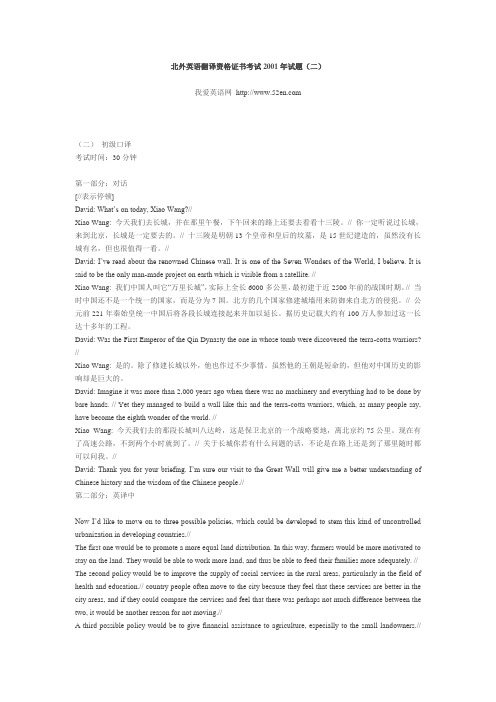
北外英语翻译资格证书考试2001年试题(二)我爱英语网 (二)初级口译考试时间:30分钟第一部分:对话[//表示停顿]David: What’s on today, Xiao Wang?//Xiao Wang: 今天我们去长城,并在那里午餐,下午回来的路上还要去看看十三陵。
// 你一定听说过长城,来到北京,长城是一定要去的。
// 十三陵是明朝13个皇帝和皇后的坟墓,是15世纪建造的,虽然没有长城有名,但也很值得一看。
//David: I’ve read about the renowned Chinese wall. It is one of the Seven Wonders of the World, I believe. It is said to be the only man-made project on earth which is visible from a satellite. //Xiao Wang: 我们中国人叫它“万里长城”,实际上全长6000多公里,最初建于近2500年前的战国时期。
// 当时中国还不是一个统一的国家,而是分为7国。
北方的几个国家修建城墙用来防御来自北方的侵犯。
// 公元前221年秦始皇统一中国后将各段长城连接起来并加以延长。
据历史记载大约有100万人参加过这一长达十多年的工程。
David: Was the First Emperor of the Qin Dynasty the one in whose tomb were discovered the terra-cotta warriors? //Xiao Wang: 是的。
除了修建长城以外,他也作过不少事情。
虽然他的王朝是短命的,但他对中国历史的影响却是巨大的。
David: Imagine it was more than 2,000 years ago when there was no machinery and everything had to be done by bare hands. // Yet they managed to build a wall like this and the terra-cotta warriors, which, as many people say, have become the eighth wonder of the world. //Xiao Wang: 今天我们去的那段长城叫八达岭,这是保卫北京的一个战略要地,离北京约75公里。

09北外MTI真题I.? Translate the following passages into Chinese and write your translation on the answer sheet. (50 points-25 points x 2)Passage 1In Defense of Translationby Howard Goldblatt (葛浩文)How’s this for an occupational testimonial: “There is no such thing as a good translator. The best translators make the worst mistakes. No matter how much I love them, all translators must be closely watched。
”Who are these people everyone loves to hate, and, if they're so bad, how do they get away with what they're doing?Well, I confess: I'm one of them. I'm a translator。
…I am sometimes asked why I translate, since to many it seems a thankless vocation. Why, they ask, don't I write my own novels, since I have lived (they assume) an interesting life and must by now have an idea of what a novel should be? I can only say that not all translators are closet novelists, and that I do not consider translation to be a lesser art -- one that ought to lead to something better. The short, and very personal, answer to the question is: Because I love it. I love to read Chinese; I love to write in English. I love the challenge, the ambiguity, and the uncertainty of the enterprise. I love the tension between creativity and fidelity, even the inevitable compromises. And, every once in a while, I find a work so exciting that I'm possessed by the urge to put it into English. In other words, I translate to stay alive. The satisfaction of knowing I've faithfully served two constituencies keeps me happily turning good, bad, and indifferent Chinese prose into readable, accessible, and -- yes -- even marketable English books. Tian na! (276 words)Passage 2Downsizing in VogueIn recent years corporate downsizing has been on the rise throughout the world. Downsizing is reducing costs by dismissing employees and reassigning their duties to the employees who remain. They usually call it restructuring, rightsizing, reallocating resources, or job separation. They sometimes use dieting metaphors like "trimming the fat," "getting lean and mean," or "shedding weight." Whatever the euphemism, employees affected by these practices know what the words mean to them: layoff. And no "kinder, gentler" words can do much to alleviate the anxiety and distress that come with losing a job。
![北京外国语大学英汉同声传译2003[试卷+答案]考研真题/考研试卷/笔记讲义/下载](https://img.taocdn.com/s1/m/48cbd4c35ebfc77da26925c52cc58bd631869378.png)
北京外国语大学2003年硕士研究生入学考试英汉同声传译专业试卷Ⅰ.将以下单句译成汉语。
〔25分〕1. Poets are born, but orators are made.2. There exists today new opportunities for promotion of DNP〔裁军和不扩散〕education and training at all levels, primarily, thanks to the revolution in technology and communication.3. Such is human nature in the West that a great many people are often willing to sacrifice higher pay for the privilege of becoming white collar workers.4. China looks to Hollywood much like the Arctic National Wildlife Refuge must look to the oil industry: vast, untapped and potentially fat.5. Beyond torturing Germany’s relationship with the United States, the go-it-alone stance, coming from a government that has presented itself as a sworn adherent of multilateralism, tends to diminish Be rlin’s influence among its EU neighbours.Ⅱ.将以下短文译成汉语。
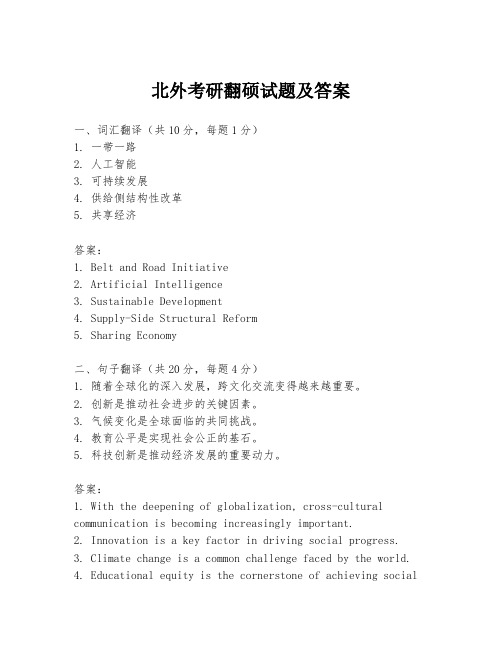
北外考研翻硕试题及答案一、词汇翻译(共10分,每题1分)1. 一带一路2. 人工智能3. 可持续发展4. 供给侧结构性改革5. 共享经济答案:1. Belt and Road Initiative2. Artificial Intelligence3. Sustainable Development4. Supply-Side Structural Reform5. Sharing Economy二、句子翻译(共20分,每题4分)1. 随着全球化的深入发展,跨文化交流变得越来越重要。
2. 创新是推动社会进步的关键因素。
3. 气候变化是全球面临的共同挑战。
4. 教育公平是实现社会公正的基石。
5. 科技创新是推动经济发展的重要动力。
答案:1. With the deepening of globalization, cross-cultural communication is becoming increasingly important.2. Innovation is a key factor in driving social progress.3. Climate change is a common challenge faced by the world.4. Educational equity is the cornerstone of achieving socialjustice.5. Technological innovation is an important driving force for economic development.三、段落翻译(共40分,每题10分)1. 中国的改革开放政策极大地促进了经济的快速发展,提高了人民的生活水平,并为世界经济的增长作出了重要贡献。
2. 随着互联网技术的飞速发展,电子商务已经成为人们日常生活中不可或缺的一部分,极大地改变了人们的购物方式。

北京同声传译北京外国语大学同声传译试卷导读:就爱阅读网友为您分享以下“北京外国语大学同声传译试卷”资讯,希望对您有所帮助,感谢您对92to 的支持!北京外国语大学2001年硕士研究生入学考试英汉同声传译专业试卷I. 将下列短文译成英语(35%)不久前美国宇航局宣布,他们测得的数据显示,在最近两个月,南极上空的臭氧空洞已扩大到智利南部城市篷塔阿雷纳斯(Punta Arenas)上空。
这是迄今人类所观测到的最大一个空洞。
更为严重的是,这也是臭氧空洞第一次覆盖一个人口稠密的城市。
许多人对臭氧的作用并不陌生,臭氧距地面约25-30公里,能吸收99%的太阳紫外线,可以说,它是地球生态环境的天然屏障,也是人类繁衍生存的保护伞。
据科学家测算,大气中臭氧含量每减少1%,太阳紫外线的辐射量就会增加2%,而人类皮肤癌患者就会增加5%至7%。
但现在,可以说一个城市的所有居民就处在集体患皮肤癌的危险中。
为了居民的身体健康,篷塔阿雷纳斯及其临近地区被迫宣布进入紧急状态。
这很可能也是人类第一次因臭氧空洞问题而进入紧急状态。
篷塔阿雷纳斯卫生部门再三告诫市民,最好不要在中午11点到下午3点之间外出,因为在阳光下曝晒7分钟左右,皮肤就会受到损伤。
据科学家们观测,臭氧空洞目前已达到2800多万平方公里,而造成臭氧空洞的,正是人类在工业生产中不断释放出氟利昂等化学物质,才使臭氧越来越稀薄,最后形成了现在这个巨大无比的空洞。
虽然这次臭氧空洞扩大,还因为南极大陆的气温不断升高所致,但气温的升高,又与人类大量释放二氧化碳有直接的关系。
但愿篷塔阿雷纳斯的警报是第一次,也是最后一次!II. 将下列单句译成英语(15%)1 我们诚心诚意地希望不发生战争, 争取长时间的和平, 集中精力搞好国内现代化建设。
2 冷战后,世界形势出现了重大的变化,两极格局宣告终结,多极化成为国际格局演变的主导方向。
3 近些年来,在经济全球化的冲击下,原有的分工格局和资源配置方式正在发生历史性的重要转变。
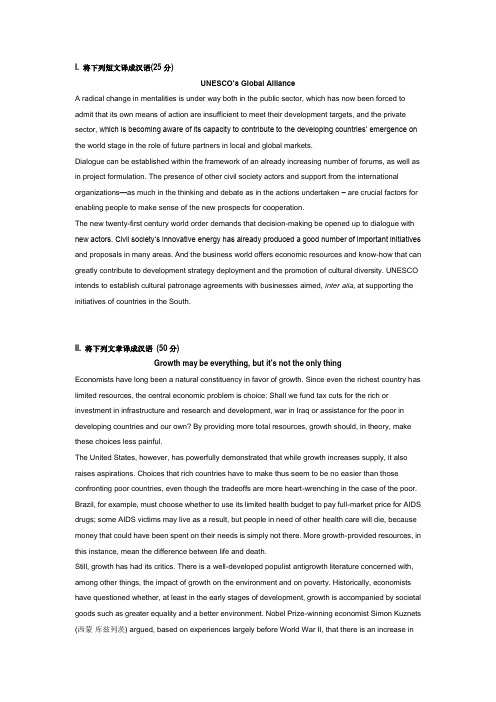
I. 将下列短文译成汉语(25分)UNESCO’s Global AllianceA radical change in mentalities is under way both in the public sector, which has now been forced to admit that its own means of action are insufficient to meet their development targets, and the private sector, which is becoming aware of its capacity to contribute to the developing countries’ emergence on the world stage in the role of future partners in local and global markets.Dialogue can be established within the framework of an already increasing number of forums, as well as in project formulation. The presence of other civil society actors and support from the international organizations—as much in the thinking and debate as in the actions undertaken – are crucial factors for enabling people to make sense of the new prospects for cooperation.The new twenty-first century world order demands that decision-making be opened up to dialogue with new actors. Civil society’s innovative energy has already produced a good number of important initiatives and proposals in many areas. And the business world offers economic resources and know-how that can greatly contribute to development strategy deployment and the promotion of cultural diversity. UNESCO intends to establish cultural patronage agreements with businesses aimed, inter alia, at supporting the initiatives of countries in the South.II. 将下列文章译成汉语(50分)Growth may be everything, but it's not the only thingEconomists have long been a natural constituency in favor of growth. Since even the richest country has limited resources, the central economic problem is choice: Shall we fund tax cuts for the rich or investment in infrastructure and research and development, war in Iraq or assistance for the poor in developing countries and our own? By providing more total resources, growth should, in theory, make these choices less painful.The United States, however, has powerfully demonstrated that while growth increases supply, it also raises aspirations. Choices that rich countries have to make thus seem to be no easier than those confronting poor countries, even though the tradeoffs are more heart-wrenching in the case of the poor. Brazil, for example, must choose whether to use its limited health budget to pay full-market price for AIDS drugs; some AIDS victims may live as a result, but people in need of other health care will die, because money that could have been spent on their needs is simply not there. More growth-provided resources, in this instance, mean the difference between life and death.Still, growth has had its critics. There is a well-developed populist antigrowth literature concerned with, among other things, the impact of growth on the environment and on poverty. Historically, economists have questioned whether, at least in the early stages of development, growth is accompanied by societal goods such as greater equality and a better environment. Nobel Prize-winning economist Simon Kuznets (西蒙·库兹列茨) argued, based on experiences largely before World War II, that there is an increase ininequality in the early stages of development. Arthur Lewis, another Nobel economist, went further: greater inequality, he argued, is necessary to generate the savings that growth requires. A later generation of economists has posited the existence of an environmental Kuznets curve: the early stages of growth cause environmental degradation, not environmental health.Kuznets and his descendants held out the prospect that eventually growth would bring more social justice (greater equality, less poverty) and a better environment. But there is nothing inevitable about this -- which means that even if it has been true in the past, it may not be in the future. Inequality did seem to fall in the United States after the Great Depression, but in the last 30 years it has increased enormously. Many forms of pollution have gone down as richer countries have turned their mind to air-quality issues, but greenhouse gas emissions -- with all the dangers they present for global warming -- have continued to increase with economic growth, especially in the United States.III. 将下列短文译成英语(25分)中国是欧亚地区重要的国家。
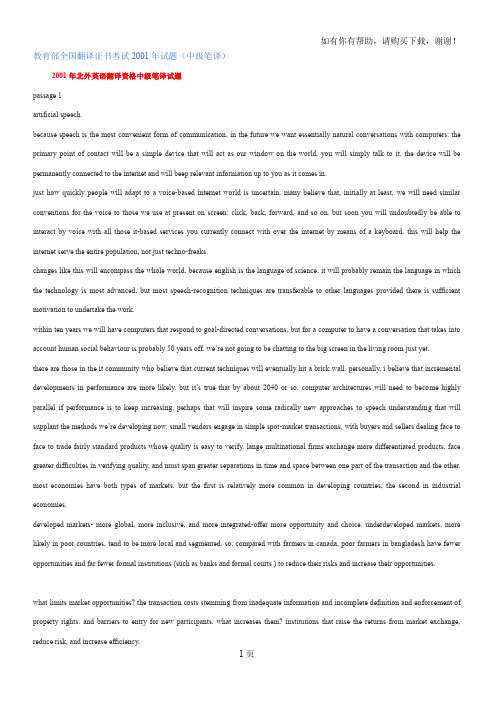
教育部全国翻译证书考试2001年试题(中级笔译)2001年北外英语翻译资格中级笔译试题passage 1artificial speechbecause speech is the most convenient form of communication, in the future we want essentially natural conversations with computers. the primary point of contact will be a simple device that will act as our window on the world. you will simply talk to it. the device will be permanently connected to the internet and will beep relevant information up to you as it comes in.just how quickly people will adapt to a voice-based internet world is uncertain. many believe that, initially at least, we will need similar conventions for the voice to those we use at present on screen: click, back, forward, and so on. but soon you will undoubtedly be able to interact by voice with all those it-based services you currently connect with over the internet by means of a keyboard. this will help the internet serve the entire population, not just techno-freaks.changes like this will encompass the whole world. because english is the language of science, it will probably remain the language in which the technology is most advanced, but most speech-recognition techniques are transferable to other languages provided there is sufficient motivation to undertake the work.within ten years we will have computers that respond to goal-directed conversations, but for a computer to have a conversation that takes into account human social behaviour is probably 50 years off. we’re not going to be chatting to the big screen in the living room just yet.there are those in the it community who believe that current techniques will eventually hit a brick wall. personally, i believe that incremental developments in performance are more likely. but it’s true that by about 2040 or so, computer architectures will need to beco me highly parallel if performance is to keep increasing. perhaps that will inspire some radically new approaches to speech understanding that will supplant the methods we’re developing now. small vendors engage in simple spot-market transactions, with buyers and sellers dealing face to face to trade fairly standard products whose quality is easy to verify. lange multinational firms exchange more differentiated products, face greater difficulties in verifying quality, and must span greater separations in time and space between one part of the transaction and the other. most economies have both types of markets. but the first is relatively more common in developing countries, the second in industrial economies.developed markets- more global, more inclusive, and more integrated-offer more opportunity and choice. underdeveloped markets, more likely in poor countries, tend to be more local and segmented. so, compared with farmers in canada, poor farmers in bangladesh have fewer opportunities and far fewer formal institutions (such as banks and formal courts ) to reduce their risks and increase their opportunities.what limits market opportunities? the transaction costs stemming from inadequate information and incomplete definition and enforcement of property rights. and barriers to entry for new participants. what increases them? institutions that raise the returns from market exchange, reduce risk, and increase efficiency.yet not all institutions promote inclusive markets. institutional designs that evolve through historical circumstances or are directed by policy makers are not necessarily the best for all of society or for economic growth and poverty reduction. for instance, state agricultural marketing boards, instead of helping farmers, have often resulted in lower incomes for them in africa. and institutions that once supported market transactions can outlive their usefulness, for example, privatization agencies and bank restructuring agencies. the challenge for policymakers is to shape institutional development in ways that enhance economic developmentPart 2 Translation from Chinese into English 2 hoursPassage 1保姆校长常常听到一些大学校长说:“我把学生当自己的儿女看待。
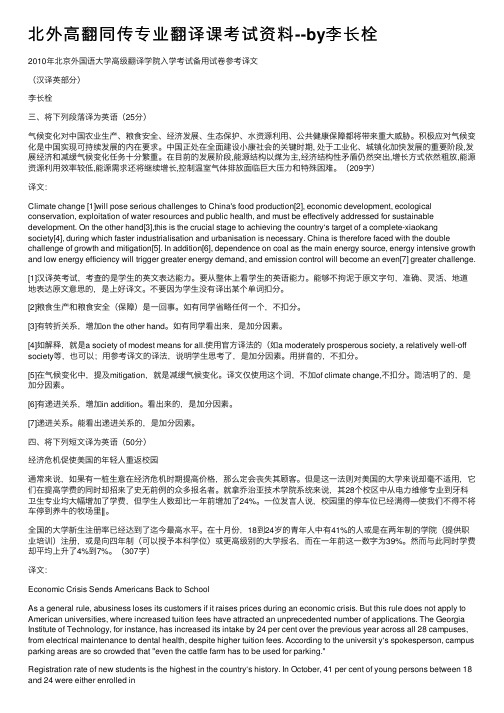
北外⾼翻同传专业翻译课考试资料--by李长栓2010年北京外国语⼤学⾼级翻译学院⼊学考试备⽤试卷参考译⽂(汉译英部分)李长栓三、将下列段落译为英语(25分)⽓候变化对中国农业⽣产、粮⾷安全、经济发展、⽣态保护、⽔资源利⽤、公共健康保障都将带来重⼤威胁。
积极应对⽓候变化是中国实现可持续发展的内在要求。
中国正处在全⾯建设⼩康社会的关键时期, 处于⼯业化、城镇化加快发展的重要阶段,发展经济和减缓⽓候变化任务⼗分繁重。
在⽬前的发展阶段,能源结构以煤为主,经济结构性⽭盾仍然突出,增长⽅式依然粗放,能源资源利⽤效率较低,能源需求还将继续增长,控制温室⽓体排放⾯临巨⼤压⼒和特殊困难。
(209字)译⽂:Climate change [1]will pose serious challenges to China's food production[2], economic development, ecological conservation, exploitation of water resources and public health, and must be effectively addressed for sustainable development. On the other hand[3],this is the crucial stage to achieving the country‘s target of a complete-xiaokangsociety[4], during which faster industrialisation and urbanisation is necessary. China is therefore faced with the double challenge of growth and mitigation[5]. In addition[6], dependence on coal as the main energy source, energy intensive growth and low energy efficiency will trigger greater energy demand, and emission control will become an even[7] greater challenge.[1]汉译英考试,考查的是学⽣的英⽂表达能⼒。

EBITA:税息折旧及摊销前利润(earnings Before Interest, Taxes, Depreciation and Amortization)OECD countries:经济合作及发展组织国家(Organization for Economic Cooperation and Development)MACK DADDY:万人迷FORENSIC medicine:法医学Telepresence:远程监控,远地视在,网络网真;远程呈现UNDP:联合国开发计划署(United Nations Development Programme)Extradition treaty:引渡条约bailout loan:救济融资;拯救性贷款;救济融资大部制:Giant department小产权房:houses with limited property rights经济适用男:budget husband; economical-and-applicable man土豪:local bully;local tyrant;local lord乳清蛋白:whey protein;lactalbumin土地承载力:land carrying capacity; land bearing capacity计划免疫:planned immunization ; planned immunity石油输出国组织:OPEC(Organization of Petroleum Exporting Countries)二,英汉两篇翻译第一篇是南北发展的一个现状什么的第二个是讲18大报告的一些内容汉英第一篇是有很多专业名词,科技园区类型的一些东西,很长,翻译了好长时间百科知识名词1五种元素2元白3水经注4汉书5李时珍6中亚7不动产8宝黛9IMF10WHO11WTO12百科全书派13六经14莎士比亚四大悲剧15三曹16佛教三大翻译家17三权分立18文艺复兴前三杰18最后的晚餐19三大宗教20马丁路德21文景之治22译事三难23赤字。
北京外国语大学2009年硕士研究生入学考试复语同声传译专业试卷 (1)北京外国语大学2008年硕士研究生入学考试英汉同声传译专业试卷(复语班) (6)北外2008年英汉同声传译专业考研试题 (11)北外2007年英汉同声传译专业考研试题 (16)北外2006年英汉同声传译专业考研试题 (22)北外2005年英汉同声传译专业考研试题 (27)北外2004年英汉同声传译专业考研试题 (32)北外2003年英汉同声传译专业考研试题 (36)北外2002年英汉同声传译专业考研试题 (41)北外2001年英汉同声传译专业考研试题 (45)北京外国语大学2009年硕士研究生入学考试复语同声传译专业试卷I.将下列文章译成汉语(50分)India and China need help to grow, not hectoringEvery time there is a spike in oil prices, or when food costs more, or there is a renewed worry about carbon and climate change, academics, pundits, and the press immediately point to the high-consumption future of India and China.They are wrong to do so when we consider the causes of energy and food challenges, and, more importantly, when we think of the actions and policies needed to manage changes in coming decades. If it is questionable that India and China are to blame for the global energy crunch, it is even less acceptable to expect them to adhere to pleas to moderate their energy consumption.Historically, energy consumption has correlated with economic growth. The present debate over energy often focuses on two dimensions: climate change (from greenhouse gases), and the scarcity of fossil fuels.With growing populations and economies, India and China will certainly consume a growing fraction of global resources, but they consume only 3 per cent and 9 per cent, respectively, of the world's petroleum today. The global leader, the US, consumes just under a quarter.Looking at future options, why does it matter if India and China are or are not similar in terms of energy consumption and needs? Global treaties aim to modify future consumption, and mechanisms or formulae that are considered fair (and likely to be ratified) must be cognizant of differences. Given the differences in their systems, needs, and incentives, a proposal meant to appeal to both may not appeal to either. Without global participation, no solution is likely work.China already has the world's second-largest electricity grid, and, at current rates of growth, it will soon become the largest electricity producer in the world. Like India, most of this is based on coal, the least “green”of the leading fossil fuels.India's present installed electricity capacity is not in the same league. The result is that, for thecoming decade, it will not be able to grow at a rate anywhere near that of China. In absolute net growth, the US will add more than twice as much capacity than India in 2007-08.China's growth of energy consumption has been positive for its population. It has now provided electricity to an estimated 98 per cent of households, unlike India or Africa. India has not met its energy growth targets even in the absence of carbon constraints –can we realistically expect it to moderate due to global concerns when it will say it is not the prime polluter?(425)II.将下列短文译成汉语(25分)The Cause of EarthquakesThe earth is divided into three main layers - a hard outer crust, a soft middle layer and a center core. The outer crust is broken into massive, irregular pieces called "plates." These plates move very slowly, driven by energy forces deep within the earth. Earthquakes occur when these moving plates grind and scrape against each other.In California, the Pacific Plate and the North American Plate meet. The Pacific Plate covers most of the Pacific Ocean floor and the California coastline. The North American Plate stretches across the North American continent and parts of the Atlantic Ocean. The primary boundary between themis the San Andreas Fault. It is more than 650 miles long and extends 10 miles deep. Many smaller faults, such as the Hayward Fault, branch from the San Andreas Fault.The Pacific Plate grinds northwestward past the North American Plate at a rate of about two inches per year. Parts of the San Andreas Fault system adapt to this movement by a constant "creep" resulting in frequent, moderate, earth tremors. In other areas, movement is not constant and strain can build up for hundreds of years resulting in strong earthquakes when it is released.Unlike other natural disasters, there is no warning for earthquakes. Future earthquakes are a serious threat to Californians, which is why the Fire Department recommends preparing before an earthquake hits. (232)III. 将下列文章译成英语(50分)“将来韵韵考上‘北大’或‘牛津’,我可能都不会这么兴奋!”魏伦斯感慨道。
韵韵是她的儿子,今年3岁。
前不久,他终于被一家公办托儿所“录取”。
“胜出”的条件之一是,可一次性交清“赞助费”3万元人民币。